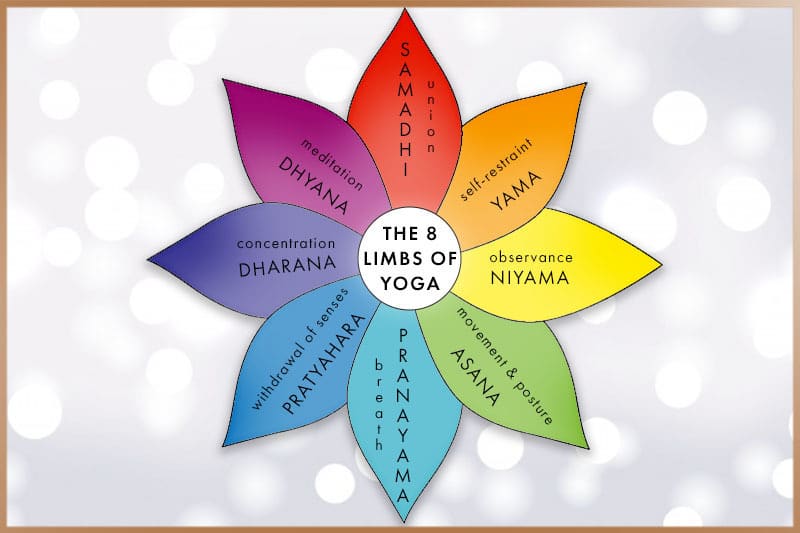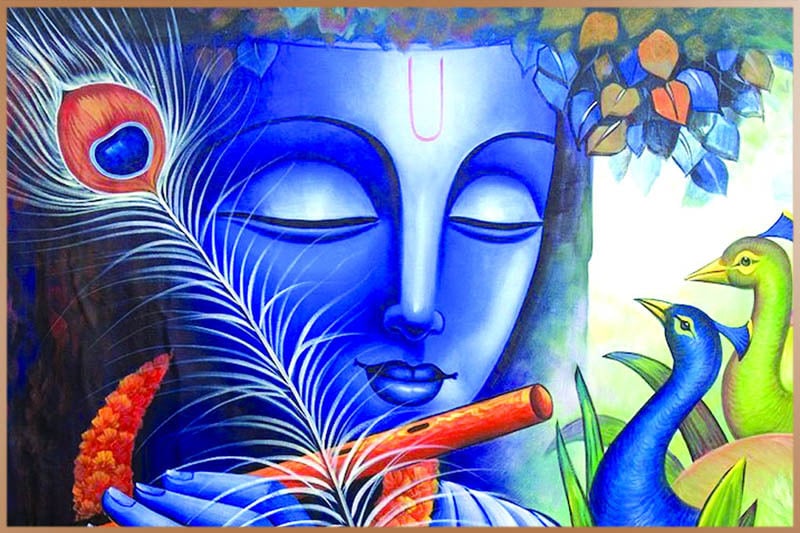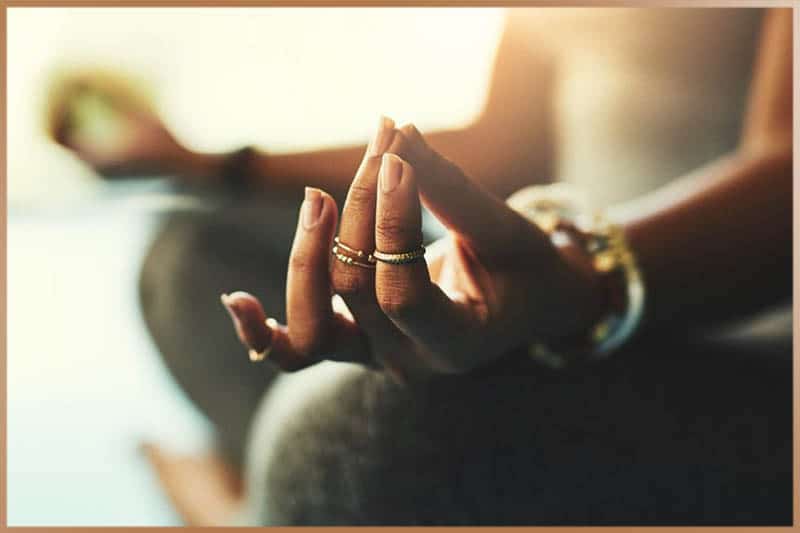
28 Mar The Eight Limbs of Yoga and Daily Practice of Yamas & Niyamas
History
The eight limbs of yoga were defined by Patanjali in the Yoga Sutras sometime between 500 BC and 400 BC. He defines yoga as having eight components: yama (abstinences), niyama (observances), asana (postures), pranayama (breath control), pratyahara (withdrawal of the senses), dharana (concentration), dhyana (meditation) and samadhi (absorption).
Most people think that yoga is just a simple exercise that helps develop flexibility, but it’s actually much more than that. The eight limbs of yoga are guidelines on how to live a meaningful and purposeful life.
Benefits
Although it dates back to ancient times, use of the eight limbs of yoga brings many benefits to modern life as well. Yoga is not just the 60-90 minutes spent on the yoga mat. It is transforming all aspects of life and reaping the benefits. If you can learn to be kind and true, and to use your energy in a useful way, you will benefit not only for yourself, but for everything and everyone around you. So we recommend that you not only learn but give a chance to practice the eight limbs of yoga on a daily basis.

What are the Eight Limbs of Yoga?
- YAMA – Restraints, moral disciplines or moral vows
- NIYAMA – Positive duties or observances
- ASANA – Posture
- PRANAYAMA – Breathing Techniques
- PRATYAHARA – Sense withdrawal
- DHARANA – Focused Concentration
- DHYANA – Meditative Absorption
- SAMADHI – Bliss or Enlightenment
By the sustained practice of the eight limbs of yoga, the impurities are destroyed and the light of wisdom, discrimination shines forth. - Patanjali
YAMA – Restraints, moral disciplines or moral vows
The first of the eight limbs of yoga is Yama. Yamas are ethical principles that help build a good relationship with the world and all that lies within it. Everything is interconnected. So our relationship with others is very important, it is an integral part of yoga.

Start practicing today
The Egely Wheel is trusted by thousands of people who practice yoga, telekinesis, meditation and healing. This device is the best solution for measuring your energy flow and efficiency of healing, and you get instant feedback.
There are five Yamas
- Ahimsa (non-violence, no harming)
- Satya (truthfulness, honesty)
- Asteya (non-stealing)
- Brahmacharya (right use of energy)
- Aparigraha (non-greed or non-possessiveness)
How do you practice Yamas daily?
Practice the Yamas with both mind and body. Our suggestion is to choose one Yama for each week that you focus on, and then observe what changes in your behavior and inner experiences from this practice. Remember that all the eight limbs of yoga are important, so in the long run, strive to introduce all eight into your life.
Ahimsa
Try to be kind for others and for yourself as well. Treating yourself with loving kindness makes it easier to treat others like that. Stay away from negative thoughts and talk and from physically harming others, yourself or nature. Those who do no harm emit “harmonious vibrations” and thus encourage others to live a peaceful life. It’s a perfect practice to say nice things to your loved ones, or even to occasionally compliment strangers you just run into on the street.
Satya
This yama combined with the first one means always be honest in a way that does no harm. Above all, be completely honest with yourself. If you can’t be honest with yourself first, you can’t really be honest in any other part of your life. Be truthful with your words, but a good tip: if it’s not beneficial to say, don’t say it.
Asteya
Stealing is also harmful in physical terms, but avoid it in other ways too, like wasting time or draining someone’s energy. Giving is the opposite of stealing, so practice giving your time and presence to others without expecting anything in return.
Brahmacharya
Brahmacharya is often translated as ‘celibacy’. Traditionally, the aim was to preserve your sexual energy so you could use it to move forward on the path of yoga. Nowadays, all that matters is that you really control your energy and use it for a good purpose. Direct your energy away from external desire and instead direct it towards finding peace and happiness.
Aparigraha
This does not forbid you to possess things, but when your thoughts and actions are based on greed, it has a negative effect on your soul. Greed is certainly destructive. This yama makes us exchange our greed for generosity: do something generous for someone.
Let your concern be with action alone, and never with the fruits of action. Do not let the results of action be your motive, and do not be attached to inaction. - Krishna, Bhagavad Gita
NIYAMA – Positive duties or observances
The second of the eight limbs of yoga is Niyama. If Yamas are a list of “do’s”, then niyamas are a list of “don’ts”. The prefix ‘ni’ is a Sanskrit verb which means ‘inward’ or ‘within’. This suggests that here you need to focus on yourself instead of your relationships with the world and others. Niyamas are internal disciplines that help you learn to respect yourself – your body, mind, and spirit. These are methods for practicing self-discipline as well as reflective exercises.

There are five Niyamas
- Saucha (purity, cleanliness)
- Santosha (contentment, gratitude)
- Tapas (discipline, persistence, burning desire or conversely)
- Svadhyaya (self-study or self-reflection and study of spiritual texts)
- Isvara Pranidhana (devotion, surrender to a higher power)
How do you practice Niyamas daily?
Daily discipline is needed to progress on the path of yoga. You can gradually get used to practicing Niyamas by introducing them one by one into your life. Study and practice a Niyama every day while also paying attention to all the eight limbs of yoga.
Saucha
Saucha keeps our bodies clean both outside and inside. Eating cleanly is one way to practice Saucha, which promotes health and the maintenance of good emotional energies. Another way is to make your environment clean and tidy. Feng shui helps cleanse your home of bad energies and thus increases the flow of good energies within us as well.
Santosha
Practice Santoshat by simply being grateful for what you have. Accept your life the way it is now and notice how much you can thank. Take 5 minutes each day to make a mental list of the things you are currently grateful for.
Tapas
Traditionally, this means being diligent and committed to yoga and self-improvement. Take 5 minutes a day and get on your yoga mat to do asanas or meditation every day this week. It can also be a half hour run a day or a daily prayer. The point is to maintain consistent practice.
Svadhyaya
The goal of this practice is to truly understand who we are through inner reflection by reading ancient yoga texts and chanting mantras. By getting to know yourself deeply, it is easier to be the best version of yourself.
Isvara pranidhana
While many religions and definitions of God exist, almost all people believe in a higher power. Yoga does not define what you should believe in, but it does emphasize the divine in all of us. We are all sacred beings, we are all one. Try to focus on this thought. One great way to practice Isvara pranidhana is to chant Om (aum) mantra. OM is the sound of the universe that connects all of us.

After all, you may have already realized that yoga isn’t just about stretching and burning calories. Yoga is more than just physical postures, as asana is only one part from the eight limbs of yoga. It balances body and mind and in addition to putting your body in the best possible shape it also provides spiritual healing for your soul. It is highly recommended for everyone to start practicing today or as soon as possible.

